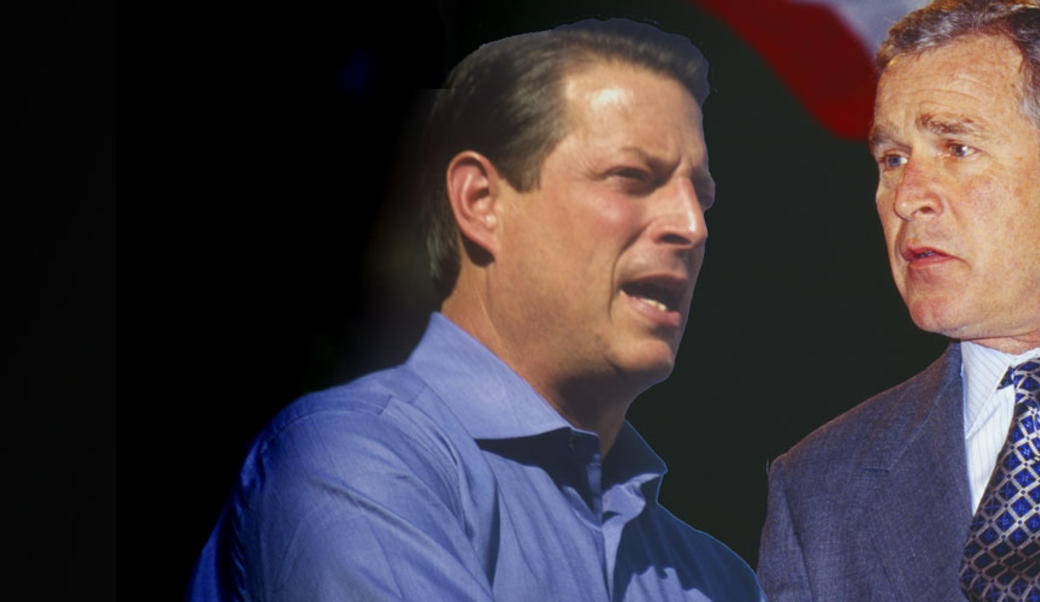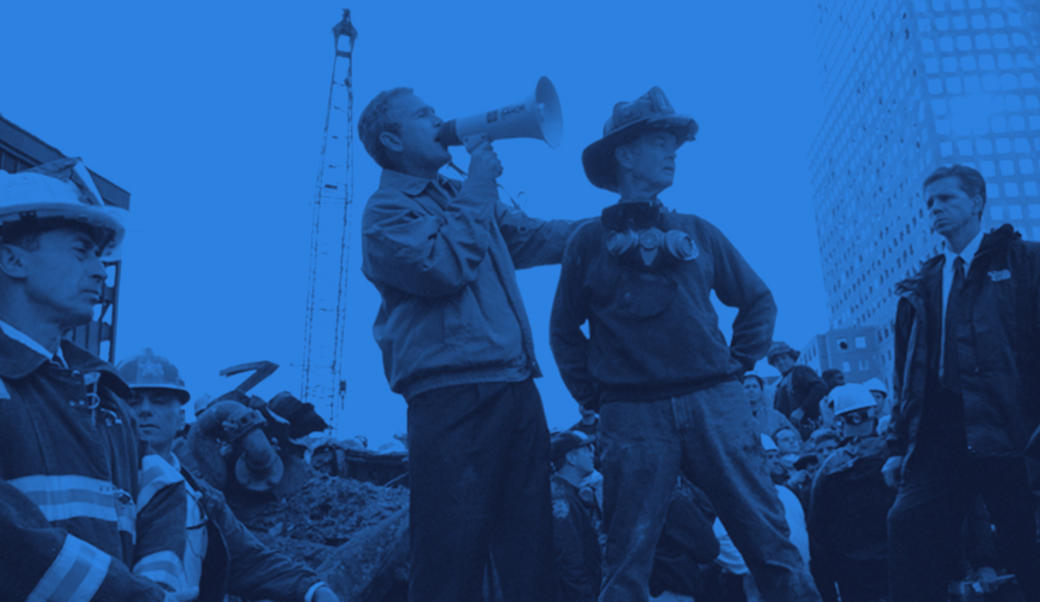George W. Bush: The American Franchise
George W. Bush promised America a "humble" foreign policy, an image that many of his critics found difficult to square with the man who led the United States into Iraq and who swaggered on the deck of the USS Abraham Lincoln on May 1, 2003, in a flight suit declaring that "major combat operations" in Iraq were over. Bush looked confident that day, and the sailors and airmen aboard gave him a rousing welcome—under a banner that read "Mission Accomplished." It was all too premature, and the Democrats who complained that the President had turned the entire U.S. Navy into a campaign photo-op began pointing to that event as something else—Bush's hubris and sense of unreality.
Good Will
When the 2000 recount was finally over, George W. Bush proved to be a gracious winner. This was made easy for him by Vice President Al Gore, who accomplished the hard task of being gracious in defeat. Gore realized that if he continued to challenge the results in Florida, there would be pressure on him to deliver an unstinting concession speech if he lost in the end. Gore provided the requisite speech and did so with perfect historical pitch, even as some of those around him were trying to explore other options to keep the contest alive."Almost a century and a half ago," he recalled, "Senator Stephen Douglas told Abraham Lincoln, who had just defeated him for the presidency, 'Partisan feeling must yield to patriotism. I'm with you, Mr. President, and God bless.' Well, in that same spirit, I say to President-elect Bush that what remains of partisan rancor must now be put aside, and may God bless his stewardship of this country." For his part, Bush spoke in the same spirit. "As I begin, I thank President Clinton for his service to our nation," Bush said at the outset of his inaugural address. "And I thank Vice President Gore for a contest conducted with spirit and ended with grace."
Bad Will
Yet Bush's attempt at lowering the level of venom in American politics didn't get far. The reasons are varied, and perhaps his goal was a naïve one to begin with. For one thing, not all Democratic Party leaders were as philosophical as Gore had been and many simply never forgave Bush for how he assumed the presidency. In an attempt to keep their activist base motivated, Democratic National Committee chairman Terence McAuliffe and other leading Democrats openly questioned the very legitimacy of Bush's presidency. In so doing, they unleashed forces they could not control, especially when they introduced the toxic subject of race and "vote suppression" into the conversation.
Tipper Gore took to publicly describing the election as the time "when we won, but the Supreme Court decided we couldn't serve." Her frustration was understandable, but she wasn't alone. "Gore . . . beat the other guy. The election was stolen," declared former Democratic nominee Michael Dukakis."We won that election, and they stole that election," McAuliffe said in a 2001 speech to the Democratic National Committee. "President Bush tells us to get over it. Well, we're not going to get over it!" Some of the nation's most prominent liberals took their cue from such comments. "Bush is not our elected President," Gloria Steinem told college audiences in 2001 and 2002. "He took office due to fraud in Florida. He should be impeached."Long before he made the documentary Fahrenheit 9/11 challenging Bush's reaction to the terrorist attacks, filmmaker Michael Moore said in an interview, "The majority of Americans never elected this guy in the White House. And I'll keep saying that until he's out of there."
Bush's Own Role
Bush was not blameless, either. After suggesting he'd staff his administration with Democrats as well as Republicans, he appointed a single Democrat, former California congressman and Clinton administration official Norman Y. Mineta, to his cabinet. "Norm felt as though he was like that kid in 'Home Alone,' one longtime Mineta aide quipped. The administration did not compromise much on its tax bill, either, meaning that it passed with only Republican support. Bush did reach across the aisle on education reform, but did so in ways that ultimately caused more ill feelings than goodwill. Democrats such as Senator Edward M. Kennedy of Massachusetts and Representative George Miller of California helped with passage of the No Child Left Behind Act, but later felt undercut by the administration when the funding levels requested by the White House and approved by the Republican-led Congress seemed too low. Senator Jim Jeffords of Vermont left the Republican Party in May 2001—breaking the tie and giving Democrats a 51-49 voting majority. One of the issues he cited most often as affecting his decision was education funding. Jeffords' defection gave every committee chairmanship in the Senate to Democrats, including Judiciary, which began stalling—or even outright rejecting—Bush's more conservative nominees.
This set up the bitter 2002 campaign. Judicial appointments may have been the stakes, but the context was the war on terrorism. Less than a year after the nation had been attacked and Democrats and Republicans had sang God Bless America together on the Capitol lawn, the two sides went at it tong and nail, with each side calling into question the patriotism of the other.
Amid talk among political professionals about "Fifty-Fifty Nation" and "red" states and "blue" states was a basic truth: the United States was becoming more polarized culturally and politically, as certain unifying forces in American life—sporting events, places of worship, network television—were themselves fragmenting into self-selecting places for the like-minded to congregate. Gerrymandered districts across the country produced a Congress in which true centrists are rare. News talk shows that at one time would try to produce a rough consensus featured, instead, designated liberal and conservative commentators who are paid—literally—to tow the party line.
Will the center hold? It's hard to see, in Washington, how it could. But as Bush and Kerry scrambled for every possible vote in a handful of battleground states, a promising thing happened. The few swing voters who are still out there began being heard—they, after all, were the main voters still being courted—and their sheer reasonableness was cause for optimism."I think what's happened is that the Republicans have really gone to the right," Linda Grabel, one of the audience members selected to ask the candidates a question at the St. Louis debate, explained later. "And the Democrats have really gone to the left. With the Democrats, if anyone has a problem, the government can help you with it. And the Republicans want to legislate morality for everybody. They're way over to the right. But most of the American people are kind of in the middle."


